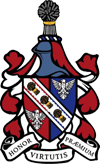Goldney Hall
| Goldney Hall | |
|---|---|
 |
|
| University | University of Bristol |
| Location | Bristol, England, BS8 1BH |
| Coordinates | 51°27′08″N 2°36′55″W / 51.4523°N 2.6154°WCoordinates: 51°27′08″N 2°36′55″W / 51.4523°N 2.6154°W |
| Motto | Honor Virtutis Præmium |
| Motto in English | "Honour is the Reward of Virtue" |
| Established | 1724, 1956 as student accommodation |
| Residents | 267 |
| Website | www |
Goldney Hall also known as Goldney House is a self-catered hall of residence in Clifton, Bristol, one of three in the area providing accommodation for students at the University of Bristol.
The Goldney family's influence in Bristol can be traced back as far as 1637 when Thomas Goldney I was sent, by his father, to Bristol from Chippenham in Wiltshire to serve as an apprentice for seven years.Thomas Goldney II, born 1664, purchased a majority of the current Goldney Estate, complete with manor house, for a fee of £100 in 1705. The lease documents from this time are available online and can be viewed here.
In 1724 the earlier house was partially demolished to be replaced by a grander building, possibly built for Goldney by George Tully, a Bristol merchant who was a partner of William Champion in the Coalbrookdale Works. The Goldney family were Quakers, however their beliefs did not prevent them developing a significant range of enterprises; ventures included:
The gardens and orchards were designed by Goldney’s son Thomas Goldney III. The house was recased, altered and extended in 1864–65 by Alfred Waterhouse, who also designed the Natural History Museum. The house later passed down to other wealthy Bristol families – The Wills and the Frys. Lewis Fry (1832–1921) who was a member of the prominent Bristol Fry Family and became the Liberal MP for Bristol and first chairman of the University of Bristol University Council.
The current house was built in 1724, is a listed building and occupies a hilltop position overlooking the city of Bristol and Brandon Hill. The landscape garden is used for weddings and receptions.
...
Wikipedia
